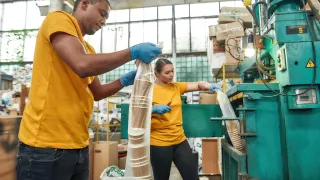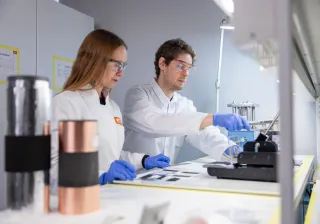VTT has developed, together with industrial partners, a unique concept to utilise Municipal Solid Waste (MSW) and biomass as a feedstock. The process combines gasification and electrolysis and merges the synthesis of products with local electricity and heat production.
For ten years, VTT has studied flexible production models for advanced transportation fuels. The newest concept combines gasification and electrolysis in a new way. The work was finalised in an EU project called FlexCHX.
In addition to combining gasification and electrolysis, VTT has created a two-way integration for the process. The primary conversion of biomass and solid waste is done locally on an intermediate scale. The process starts with collection, separation, and gasification and is followed by Fischer-Tropsch (FT) synthesis, methanol synthesis, methane synthesis, or synthesis gas fermentation to ethanol. The primary products are transported as feedstock to centralised refinery units for fuel production.
In the second phase, refineries transform the Fischer-Tropsch fractions into fuels for aviation or transportation. Only simple modifications to the existing processes are needed. The primary conversion units can be combined with local energy and heat production. "The overall efficiency of the process was proven at a good level, and local waste logistics could be utilised," says Esa Kurkela, senior Principal Scientist at VTT.
Key to large-scale production
The combination of gasification, electrolysis, and integrated production could be a key asset in producing alternative liquid fuels. "Around 30% of oil-based fuels can be replaced with fuels from biomass or MSW. But when we combine gasification and electrolysis to create double-integrated processes, the potential can double or triple," Kurkela says.
According to Kurkela´s vision, primary units could produce some 100,000 tonnes of feedstock annually. The capacity of centralised refineries could reach millions of tonnes.
What would be the fundamental reasons why the oil industry should start its MSW projects?
"First, they must get rid of oil utilisation. By 2050, the use of oil can be no more extensive than 10% of the total capacity. Secondly, if they want to go to large-scale production of renewable fuels, gasification is a promising way in addition to the power to fuels techniques. Our advantage is that we can integrate these two technologies, and syngas root is flexible for end products," Kurkela says.
Reforming adds efficiency
In addition to the overall concept, VTT has developed gasification techniques further. "The process starts with gasification followed by robust gas cleaning. Our specialty is catalytic reforming technology. It increases the conversion efficiency compared to other technologies," Kurkela says.
Catalytic reforming is an essential part of the technology. "With catalytic reforming, we can do the gasification at relatively low temperatures because we don't need to optimise the gas quality in the gasifier. About 50 percent of the energy content of the MSW is converted into hydrocarbon gases which can not be converted directly into transportation fuels. In the reformer, we transform these gases into syngas, which can be processed into fuels. This can increase the efficiency of the transformation from Fischer-Tropsch fractions to fuels quite dramatically, 40-50% in the energy level," Kurkela explains.
The second significant advantage of VTT´s process is its flexibility of feedstocks. "The process itself is similar for all feedstocks. We are not limited to any specific feedstock like some other processes are. Most of the potential in the biomass, but combined with MSW, we can get a broader feedstock base for the plants," says Ilkka Hiltunen, Research Team Leader at VTT.
MSW is cheap
The importance of MSW as a feedstock is growing. Landfilling waste is prohibited, and incineration is phasing out. It is estimated that a potential 44 million tonnes of MSW could be available in the EU in 2030. (Source: ETIP Bioenergy)
Esa Kurkela points out that MSW is a very cheap, even negatively priced raw material. However, before gasification, the waste mass has to be sorted out. "Plastic, paper, and biomaterials are fine, but we should avoid metal, glass and other easily removable items into our process," Kurkela says.
VTT has comprehensive experience in developing technologies for alternative fuels. Order here a white paper where we tell more about our offering.
This blog was originally published in 2021 and revised in 2023.




